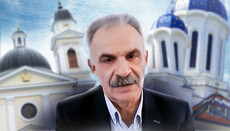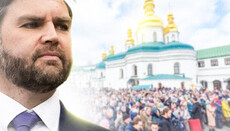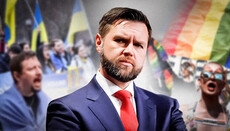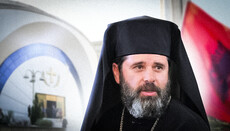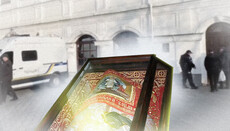"People of peace" and "party of war": who really needs peaceful Donbass
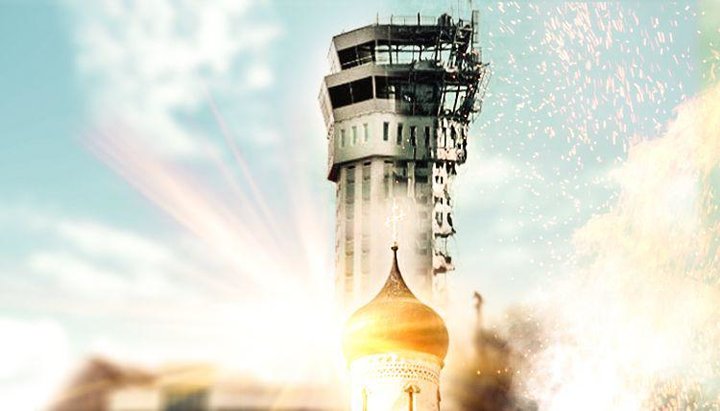
The UOC announced its decision to hold a peacemaking forum, to which the head of the NSDC reacted with threats. So who needs peace in Ukraine, and who needs war?
On August 17, 2020, the Holy Synod of the Ukrainian Orthodox Church decided to hold a peacemaking forum "People of Peace". The forum began on September 21 and is held at the Sviatogorsk Lavra. The purpose of the forum is to develop an action programme to end the conflict and restore peaceful life in eastern Ukraine. The organizing committee of the event included well-known Ukrainian public figures, representatives of culture, medicine and education, who support the Church's initiatives to end the war in the Donbass.
However, on the eve of the forum, the Secretary of the National Security and Defense Council Aleksey Danilov warned the organizers of peace forums about criminal liability: “The organizers of various “peace forums” should be reminded about the criminal liability for anti-national activities and noted that the NSDC Office of Ukraine is closely monitoring the situation in the state before the elections, and the law enforcement agencies of Ukraine will react to any attempts to undermine the internal political situation."
According to the official, attempts to do at least something for the earliest possible achievement of peace in eastern Ukraine is "an effective tool of the Russian hybrid war". He is sure that the purpose of religious processions and peace forums is "to promote the ideas of the so-called ‘Russian world’, to justify Russian aggression against Ukraine, and to promote anti-Ukrainian theses of Russian propaganda".
You have to admit this statement by the government official looks very strange because one can conclude from Danilov's words that the state or some forces that identify with it are not interested in ending the war.
So, it is not surprising that the statements of the NSDC Secretary caused a perplexed reaction in the UOC. Thus, Metropolitan Anthony (Pakanich) asks the representative of the authorities: “Can’t the death, injury, destruction and grief of ordinary people, our brothers and sisters, fail to soften the hearts of modern ‘scribes’ and ‘Pharisees’? What another cup of suffering must we all drink so that real talk about peace, and not formulations justifying its rejection, can finally be heard from all sides? How much more can you drown out the aspiration of most ordinary people, who are the real and only source of power in our country, with volleys of real and information cannons?"
Interestingly, just a few days before Danilov's scandalous statement, the NSDC published a document entitled "The Strategy of National Security and Defence of Ukraine", which says that "Ukraine strives for peace. Peace is the key to the development of Ukraine. The establishment of peace, the restoration of the sovereignty and territorial integrity of Ukraine <...> is the highest priority of the state." According to the spokesperson for the UOC, Archpriest Nikolai Danilevich, Danilov's statements contradict this document and can be qualified as an anti-state activity.
What other cup of suffering must we all drink so that real talk about peace, and not formulations justifying its rejection, can finally be heard from all sides? How much more can you drown out the aspiration of most ordinary people, who are the real and only source of power in our country, with volleys of real and information cannons?
Metropolitan Anthony (Pakanich)
Ruslan Bortnik, Director of the "Ukrainian Institute for Policy Analysis and Management", generally believes that after such words the head of the NSCO in the legal state is obliged to resign, and his threats and accusations regarding the Church's peacemaking initiatives are absurd and groundless.
However, Danilov is not alone in his accusations. His words are an expression of the position taken by various religious and political forces that use the conflict in the Donbass to achieve their goals and justify their existence. What are these forces?
"Patriots” and Donbass
Such organisations as the “National Corps’, the “Right Sector”, the “Municipal Guard”, as well as the “European Solidarity” and “Svoboda” parties consider the ratification of the Minsk Agreements to be 'betrayal' and the end of the war to be the 'triumph of revenge forces'. At the same time, representatives of these parties and organisations call themselves patriots of Ukraine and claim to defend the territorial integrity of the state and its independence and fight for peace. It is true that peace in their understanding, and even more so, the means of achieving it, are fundamentally different from generally accepted norms.
Thus, the leader of the party "European Solidarity" Petro Poroshenko at the very beginning of his presidential rule promised that the conflict in the East of Ukraine can only be resolved peacefully. But after a while, his position changed so radically that he called the peace agreements with Russia to end the war in Donbass senseless. Moreover, Poroshenko considers the proposal to hold a referendum in Ukraine on peace agreements with Russia to be a surrender.
Poroshenko's supporters also took negatively the ceasefire that the Ukrainian authorities managed to achieve with representatives of the uncontrolled territories. On 27 July 2020, representatives of the National Corps, European Solidarity and organizations sympathetic to the former President of Ukraine organize protests "against the surrender". In the statement of the Poroshenko party, the ceasefire is directly called high treason: "A man named Zelensky forbade the Ukrainian army to defend Ukraine. There seems to be high treason here... The Ukrainian army was attacked from the rear. It was attacked by the man named Zelensky".
In the statement of the Poroshenko party, the ceasefire is directly called high treason: "A man named Zelensky forbade the Ukrainian army to defend Ukraine. There seems to be high treason here... The Ukrainian army was attacked from the rear. It was attacked by the man named Zelensky".
In turn, the leader of the "National Corps" Andrey Biletsky goes further than Poroshenko and offers his solution to the "Donbass problem" – to starve the citizens of Ukraine living there. According to him, “we can arrange not a clown, but a real adequate blockade. Cut off electricity and water – everything that Ukraine supplies to this territory. We must build a wall and force them to surrender. This way we will quickly end the suffering of people." Such a peculiar understanding of humanism by Biletsky is not surprising because the Ukrainian government includes people who support him.
Deputy Prime Minister of Ukraine and Minister for the "reintegration of the occupied territories of Ukraine" Alexey Reznikov agreed with the need to turn off the water for the Donbass. But, according to him, it is a matter of time, because now the shutdown of water in the Donbass will leave the residents of Mariupol without it. He assured that the Ukrainian government is working on this issue, in particular, it plans to build a water pipeline bypassing the Donbass.
In this regard, we should also recall how the radicals disrupted the presentation of the National Platform for Reconciliation and Unity, aimed at a policy of reconciliation in the Donbass, and beat the advisor to the NSDC Secretary Sergei Sivokho. We can also cite other facts and statements of those who call themselves "patriots" of Ukraine about the inadmissibility of peace agreements with the Donbass. But it is quite obvious that all militaristic statements are aimed exclusively at achieving political goals.
OCU, UGCC, UOC-KP and Donbass
Regarding peace in the Donbass, representatives of the “patriotic” Ukrainian “Churches” – the UGCC, the OCU and the UOC-KP take a position similar to that of the radicals and Poroshenko.
For example, Sviatoslav Shevchuk is sure that "only those who think only how to save their skin are tired of the war in the Donbass". In his opinion, "it is very dangerous when in such circumstances someone will speak about the need to end the war at any cost, neglecting truth and justice". The head of the UGCC constantly stresses that he and his supporters "do not need peace in the Donbass at any cost".
In addition, the Uniates are actively involved in the sacralization of the Donbass war. For example, quite recently, Bishop of the UGCC Stepan Sus has called the JFO fighters "new martyrs" and stated that "their life is the answer to the evangelical youth when he asked what good should be done in order to have eternal life" (as we remember, Christ's answer to this young man was completely otherwise).
The head of the OCU, Epiphany Dumenko, echoing the Uniates, wishes the Ukrainians "a victorious end to the war in eastern Ukraine". He is confident, "the Lord helps us to go further along the path of truth, which will lead us to complete victory." The head of the OCU does not speak about any peace, dialogue, ceasefire – only about "victory". At what cost? How many lives will have to be sacrificed for this "victory"? Dumenko does not ask these questions. That is why he clearly, almost word for word, repeats what Poroshenko and the radicals keep saying: "only the victory over the aggressor and the achievement of not capitulation to the enemy, to which, speaking of peace, some politicians are actually calling, but a real just peace."
On August 20, Epiphany said that Ukrainians "must, first of all, think about winning an undeclared war". It is clear from these words that Dumenko does not need peace – he needs "victory".
Epiphany Dumenko needs only “victory over the aggressor and the achievement of not capitulation to the enemy, to which, speaking of peace, some politicians are actually calling, but a real just peace”.
The “archbishop” of the OCU, Afanasy Shkurupiy, went even further than his immediate superior, accusing Vladimir Zelensky and the leadership of the Armed Forces of Ukraine of “terrible betrayal”, and actually called the people to an uprising because of the ceasefire in the Donbass.
Another high-ranked priest of the OCU, "Archbishop" Nestor of Ternopil and Kremenets, believes that the war in the Donbass enables us to feel what Ukraine means to us, and all those killed in the Joint Forces Operation (JFO) are just "bricks" of Ukrainian statehood.
"People of peace" vs "people of war"
The Ukrainian Orthodox Church as the largest religious denomination in the country has defended the position of peaceful resolution of the conflict from the very beginning of the confrontation in the East of Ukraine. Dialogue and reconciliation, not cannons and guns – this is what the clergy and representatives of the UOC call for.
Beatitude Onuphry said it as simple as possible – people should just look into each other's eyes: "The moment when we see the eyes of our opponent, even the enemy, dispels a lot of wrong stereotypes that are formed in our soul because we do not see each other. We cannot verbally express all our feelings, experiences, while our eyes speak of everything. That is why it's so important to look into each other's eyes.
This peacemaking position is opposed by those who consider themselves to be "patriotic" forces. And here we meet representatives of political parties and, unfortunately, representatives of various confessions – first of all, the UGCC, the OCU and the UOC-KP.
With politicians, everything is clear – without war in the East of Ukraine, the “National Corps” and “European Solidarity” and other "patriotic forces" of the country will simply lose the very reason for their existence. After all, their entire "political programme" is built on confrontation with Russia, aggression and hatred. For them, to stop the war means to disappear, to fall into oblivion. In addition, purely material benefits can be added to political moments. According to Sergei Sivokho, “Some people don't need peace. They want war. Because war is business and big money."
Without war in the East of Ukraine, the “National Corps” and “European Solidarity” and other "patriotic forces" of the country will simply lose the very reason for their existence.
But what about "Churches"? What do Shevchuk, Dumenko and Denisenko do when they talk about "the war to its victorious end"? Probably, their considerations were best expressed by Filaret, the main figure of the Ukrainian schism: "Many people did not want to join the Kyiv Patriarchate. Why? A non-canonical Church. Schismatics. The Lord allowed war. The war showed us who is who. Starting with the first soldiers who died in the Donbass, people began to move in hundreds, tens, hundreds of thousands to the Kyiv Patriarchate.”
It is interesting that in this statement Denisenko, typical of the "Ukrainian patriotic Churches", mixes purely church concepts with anti-church ones. After all, in his words, the war in the Donbass levels out the anti-canonical status of the UOC-KP! So, it turns out that the Uniates and schismatics need the conflict in the East of Ukraine to feel their "legitimacy" in the eyes of Ukrainian society.
These religious organizations parasitize on the war in the same way as politicians. For them, "national idea" or "patriotism" is synonymous with war. It is the cannons and guns that justify the words and activities of these pseudo-patriots. They do not even want to win. They need war because it pays the maximum political dividends.
And it is indicative that the political preferences of representatives of "patriotic confessions" are almost entirely in line with the slogan "Army. Language. Faith". There are very few, in fact, but they are active, much more active than those who seek peace. But the Ukrainians should finally hear not them but the peacemakers and look into each other's eyes.
